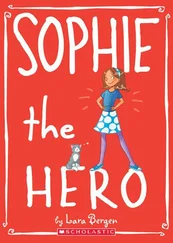Aunt Masha chose to ignore the laughter and proceeded with Nastya’s story.
“She was sent to our orphanage about a year ago. Her mom died in a car crash. No dad. No relatives. Apparently her mom was an orphan too. A young girl, she was only twenty-two when she died. And Nastya was in a bad shape. Sobbing all the time. Refusing to eat, refusing to talk. Then there were these fights with other kids. Nastya didn’t get along with them. The teachers complained that she would bite other children. They nicknamed her Mad Dog.”
There was that indecent sputtering laughter again. And again Aunt Masha chose to ignore it.
“There was talk of transferring her to an institution for mentally challenged children. You can imagine what happens to kids there. And I just knew that she was a perfectly normal kid, and a smart wonderful kid at that. I could see it in her eyes.”
Regina still wasn’t registering what any of this had to do with her. She sat there nodding, shaking her head from time to time, as if she were listening to a radio play.
“Look, I’m digging a grave for my Barbie,” Nastya yelled from her sandbox.
“Good girl,” Aunt Masha yelled back. “Dig her a big one.
“So I would take her aside,” she continued, “and try to comfort her, play with her, read to her, and she started to respond to me. She got better. But then every time my shift would end, she would break down crying, and sometimes I would just bring her home with me. Our director didn’t mind. Tatyana Ivanovna, you must have seen her at your mom’s funeral. A nice woman. Not very bright, far from it, but with a heart. So I would just bring Nastya home, and then I would let her stay during vacations, and then gradually she just started to live with me unofficially.”
“That sounds like an ideal situation for both of you,” Regina said.
“No, Regina,” Aunt Masha said, her voice turning low and grave. “The situation is not ideal. They won’t let me legally adopt her, because I’m too old, so this whole arrangement is hanging on Tatyana Ivanovna’s goodwill. What if she leaves? What if they take Nastya away from me? And then what if I drop dead tomorrow? Look what happened to Olga, and she was healthy as a horse her whole life! While I have high blood pressure, diabetes, kidney problems. Regina, you have to take her!”
Aunt Masha took Regina’s hand and squeezed it so tightly that Regina cried out in pain because her wedding ring cut into the flesh of her little finger.
No, she wanted to scream. No! No! No!
It took enormous effort for her to answer in a normal voice. “No, Masha, I can’t do this.”
“And why the hell not?” Aunt Masha asked. She was getting flushed and angry again, and a little bit crazy. Regina remembered the violent fights she and her mother sometimes had. There was even that one time when Aunt Masha had slapped her mother across the face. She looked as if she was ready to slap Regina now.
“You’re young, you’re healthy,” she said, “you’re happily married. Your husband sounds like a kind, responsible man. You have plenty of money. So why don’t you do a single unselfish thing in your life and save this little girl?”
Now it was Regina who felt like hitting Aunt Masha. “I can’t,” she said. “I simply can’t.”
“Tell me why.”
Regina wanted to say that Bob wouldn’t go for it. But that wasn’t true. In fact, she was almost sure that Bob would welcome the idea. The problem was her and her alone, and Aunt Masha knew this. Then a thought of salvation occurred to her.
“Well, what about Dima Yakovlev’s law? We are Americans so we can’t adopt a Russian child.”
This law was named after an adopted Russian boy who died in a parked car, left there by his adoptive American parents. The law imposed by Putin’s government in 2012 prohibited American citizens from adopting Russian children. It was an ugly hypocritical law. It was designed to hurt Americans, but it actually robbed Russian orphans of their chance to have a decent future. When she first heard about it, Regina was infuriated. Now she felt almost grateful.
“I’ve thought about Dima Yakovlev’s law,” Masha said. “And there is a way to get around it. You’re not an American citizen yet?”
“I have a green card.”
“Yes. But do you still have your Russian passport?”
“I do,” Regina said reluctantly.
“There you go. They can’t refuse a Russian citizen, can they? Especially one like you, who can afford a really large bribe. I happen to know just the person to bribe. And nobody needs to know that you’re planning to live in the United States with the child.”
Regina looked at Nastya squatting in the sandbox, building a sand mound with a focused expression on her face. She tried to imagine Nastya living in their Tribeca loft. They would have to outfit their guest bedroom as a room for a child. Buy the furniture, buy clothes, buy toys. She would have to learn how to care for a child. There were books on the subject. There were people to help her. Bob knew how to care for a child. Vica and Sergey knew. Nastya would go to school. She would go to doctors. She must have been deeply damaged — just look at her digging that grave — but there were child psychologists for that. All the little practicalities were doable. And yet there was something that made the whole thing impossible.
She could imagine taking care of Nastya and even doing it well, but she couldn’t imagine loving her. A parental love was the craziest, the most incomprehensible of human emotions for her. You had to love somebody ferociously, absolutely, no matter what. Look at Vica and Sergey, who seemed to be competing for the worst parent award (both negligent, permissive, easily annoyed, preoccupied with themselves), and yet they were both crazy about their boy. And look at her mother, forcing her to wear a broom, with her fierce attempts to rule her love life, with her violent fight to keep Regina at her side. No matter how misguided, that was real love.
“I don’t think I can love a child,” Regina said. “I’ve known this for a long time. I don’t have the capacity for that. And a child deserves to be loved fully and absolutely.”
Aunt Masha’s features seemed to soften. She reached out and stroked Regina’s hand in the same way she’d stroked that stray dog.
“Look at it this way, Regina. Suppose you take Nastya and you can’t love her the way a mother would. You would still take care of her, you just won’t love her enough. She’d be fine, just slightly underloved. Now, compare this fate to the fate of somebody destined to spend a lifetime in a state-sponsored Russian orphanage.”
As if on cue, Nastya smiled and waved at them with her little shovel.
“Listen,” Aunt Masha said in the softest voice she was capable of. “You don’t have to decide now. Think about it, talk to your husband. Spend some time with Nastya just to try it out. We won’t tell her anything until you decide.”
Regina felt a numb horror. A well-planned trap. A horrible, sticky, suffocating trap. If she refused, she would be saddled with a horrible guilt for the rest of her life. She hadn’t done anything wrong and yet she would have to carry that guilt. And if she agreed…But she couldn’t agree! She couldn’t! And since the only impulse of a trapped person was to try to escape, that was what Regina did.
“I can’t! You can’t do this to me. It’s unfair!” she screamed and stood up with such force that the stray dog under the bench jumped up in fear.
“Masha, what is it?” asked a scared Nastya from the sandbox.
“Let’s go,” Aunt Masha said. “Regina has to go to the airport.”
They walked back to the apartment. This time it was Aunt Masha who was holding Nastya’s hand. Regina packed her things in a hurry and picked up the suitcase with her mother’s things.
Читать дальше












